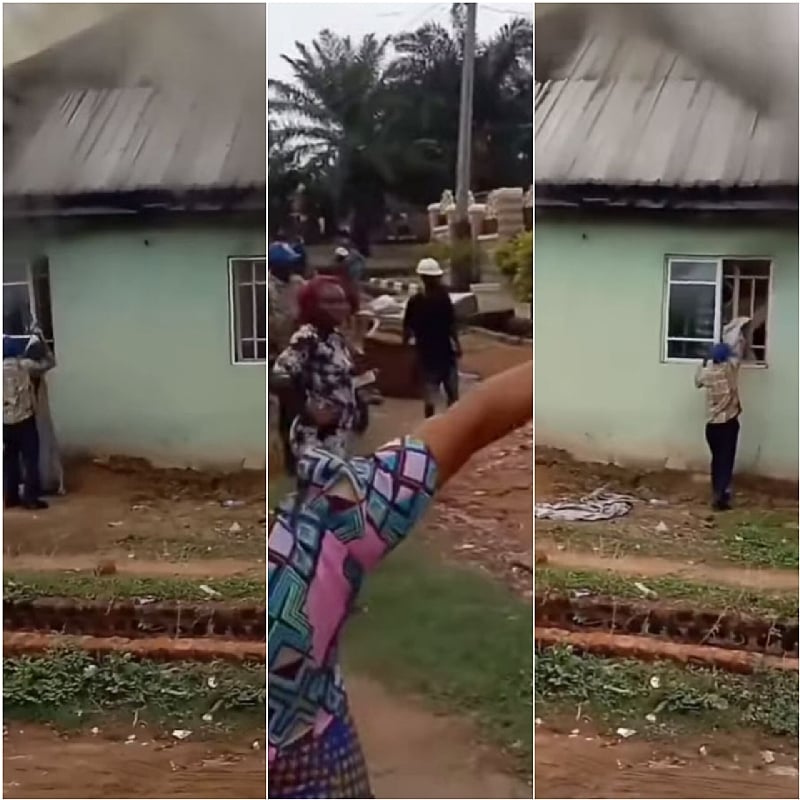The dramatic footage of a fire engulfing a building in Nigeria, juxtaposed with a woman’s fervent prayers for divine intervention, sparked a whirlwind of reactions across social media. The video depicts a chaotic scene: a building consumed by flames, a woman beside it, immersed in passionate prayer, and a handful of individuals attempting to quell the blaze with what appear to be limited resources. The woman’s audible prayers, punctuated by cries and speaking in tongues, beseech a higher power—specifically the “God of Elijah”—to extinguish the fire. This juxtaposition of spiritual supplication and a tangible, escalating physical crisis became the crux of the online debate that ensued.
The woman’s impassioned pleas, invoking phrases like “Holy Ghost fire” and “Unchangeable changer,” underscored her profound faith and reliance on divine intervention. Her visible distress and unwavering belief resonated with some viewers, who lauded her devotion and interpreted her actions as a testament to the power of prayer. These individuals viewed her response as a natural and understandable reaction in a moment of crisis, emphasizing the importance of spiritual solace and seeking divine assistance. They argued that prayer offers comfort, strength, and hope, even in the face of seemingly insurmountable challenges. For them, the woman’s actions represented a deeply personal and meaningful expression of her faith.
However, another segment of online commentators adopted a more critical perspective, questioning the efficacy of prayer in such a situation. They argued that focusing solely on prayer, while neglecting practical measures to combat the fire, was counterproductive and potentially dangerous. These critics emphasized the importance of swift and decisive action in fire emergencies, highlighting the role of fire extinguishers, emergency services, and coordinated efforts to control the blaze. They contended that relying solely on divine intervention could delay or impede necessary actions that could have mitigated the damage and potentially saved lives and property.
This incident ignited a broader discussion on the role of faith and action in times of crisis. While some believe that prayer can complement practical efforts, others assert that prioritizing practical measures is crucial. The debate highlights the diverse perspectives on the interplay between faith and action, and the often complex relationship between spiritual beliefs and real-world responses to emergencies. Ultimately, the incident underscores the importance of preparedness and the need for a multi-pronged approach to crisis management, incorporating both physical action and, for those who find solace in it, spiritual support.
Adding another layer to the narrative, the individual who filmed the incident offered a potential explanation for the fire’s origin, suggesting that the building had experienced low current the previous day. This detail introduced the possibility of electrical faults as a contributing factor, shifting the focus, at least partially, from the purely spiritual to the practical realm of potential negligence or infrastructural issues. This information invited further speculation and highlighted the importance of thorough investigations to determine the exact cause of such incidents, moving beyond anecdotal observations and emphasizing the need for evidence-based conclusions.
The viral video serves as a microcosm of broader societal discussions about faith, action, and the human response to crises. It exemplifies the tension between relying on divine intervention and taking practical steps to address challenges. While the woman’s fervent prayers highlighted the importance of spiritual comfort and the power of faith for many, the critiques underscored the crucial role of decisive action in emergencies. The added element of a possible electrical fault further complicated the narrative, emphasizing the need for thorough investigations and a nuanced understanding of the factors contributing to such events. The incident ultimately served as a poignant reminder of the complexities of human response in times of crisis and the diverse ways in which individuals seek solace and solutions.














